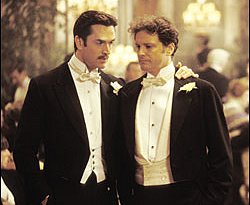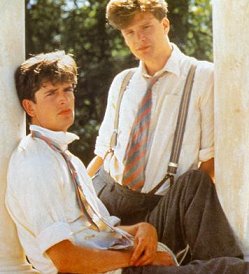Polite and funny, in a quiet, guarded way, Firth seemed comfortable discussing the appalling literacy rate in England, the decline of high culture and the performance of Prime Minister Tony Blair, while his more flamboyant co-star kept reporters in stitches, chatting about drag queens, Victorian rave parties and the performance of Madonna. (Don't even get him started on why there won't be a gay James Bond in his lifetime!) Everett insisted that he and Firth are great friends now, but recalled a time when the differences in their personalities created tension on previous film projects. "He was very serious in the old days," Everett told United Press International of his "Shakespeare in Love" co-star. "He was always strumming on a guitar and he was very left wing and he was going to give the first money he had to charity." Everett also acted opposite Firth in the 1984 film, "Another Country," which marked both actors' film debut. Serious in the old days, huh? "Oh, was he serious today?" Everett feigned surprise. "Well, see, no, you have to wind him up, the point being, he's a really good person to wind up. As soon as you've wound him up, he's really funny."
"Well, it was my gig, I must say. I had done the play originally," he argued. Reminded that Firth had also appeared in the stage version, Everett sniffed: "Yeah. But, I discovered it." "I had flogged it around the provinces and then brought it into the West End and my best friend was the guy who brought it into the West End and it was also my best friend who produced the movie and we were looking for a new guy to play the other part and so he was . . . he wasn't number two, but it was my gig and we didn't really get along," the actor explained. He then added, "We had such a laugh doing this film, I must say . . . I love him now." Firth's serious demeanor has served him well over the years. He became an unlikely sex symbol as Mr. Darcy in the smash BBC version of "Pride and Prejudice," then starred as haughty, unscrupulous men in "Circle of Friends" and "Shakespeare in Love" before landing the role of an austere, yet appealing barrister in "Bridget Jones's Diary." Everett followed up his scene-stealing turn in the Julia Roberts blockbuster, "My Best Friend's Wedding," with a critically acclaimed performance in another Wilde play-turned-movie, "An Ideal Husband." In "The Importance of Being Earnest," Firth plays Jack, a responsible bachelor who adopts a roguish alter-ego (Ernest) in an effort to chase away the doldrums of country life. Everett plays his trouble-making friend, Algy. Despite their differences, both Firth and Everett professed a deep appreciation for Wilde's timeless wit and wisdom. "I think its frothiness is extremely deceptive," warned Firth. "I think that its triviality is very defiant . . .This was his last play. It's generally considered his greatest and there is a paradox about him being his deepest when he is at his most trivial and I think that's the case with this. I think that it is so witty it can only come from a mind with a great deal of aggression . . . It's perverse and it's self-contradictory and I think that Oscar Wilde's point of view on things would still be considered extremely upsetting to people now. "If you let this guy loose on your kids, he'd be teaching them stuff . . . You think school prayer causes problems. He'd be kicked out of schools right across this country and in England, too. He'd be telling kids that having a color sense is better than having a sense of right and wrong . . . He preached against family, marriage and private property. He was full of self-contradictions and stuff that would certainly upset the conservatives in any country, so he loved stuff that pulled the rug from under [people,]" he concluded. "I think it does have contemporary resonance," Everett agreed. "I think the whole Wildean thing has contemporary resonance, the Wildean thing being his obsession with, you know, what's on the surface and what's underneath the surface. You know, this was before (Sigmund]) Freud and (Carl) Jung really had even made us aware that there was something beneath the surface because when he was writing—and this is one of the extraordinary things about him—there was no such thing as sub-conscious, really . . . "He was obsessed by the front of these English upper-class people and how rotten to the core really they were inside and the funny way of explaining it. And he came into England when England was at the center of this empire, at the high point of this empire and the English thought they were the fairest, most lenient . . .They're very proud of their law, the way they behaved, they thought they were the most fantastic people, but actually they were hideous monsters! They ruled the world with a will of iron. They didn't let anyone do anything. "They had this front, you know? Very high moral codes, ethical codes, but underneath that . . . and provided you kept that front, you could do anything you wanted underneath it. You just have to look at the ledgers of Queen Victoria's pharmacists' bills . . . She used to have laudanum and cocaine and heroine, major doses of them. So, underneath this Victorian austerity were kind of chill-out rave parties, so it was a world of real double standards and probably because Wilde was one thing and pretending to be another, it was the thing he immediately clocked into with the English upper classes. "So, you have 'The Importance of Being Earnest,' which is the kind of comedic resolution of it and then you have 'The Picture of Dorian Gray,' which is the subtly more macabre version that society is represented as this beautiful young man who has got everything ahead of him, but actually inside he is rotten to the core and I think these two ideas are still really resonant now because, actually, in the Calvin Klein structure that we have today, anything is possible, provided you have the right outward signs of being behind the country, behind doing the right thing, having the right ideas, but inside, society is in the same position, just as shady, so I think there still interesting ideas," he explained. [...] Firth, on the other hand, is busy fielding questions from fans about the possibility of another Bridget Jones movie. Helen Fielding, the author of the book that the immensely successful film was based on has written a follow-up, which, interestingly (not Sally Jesse Raphael and a dwarf interesting, but interesting enough,) features Colin Firth, the actor, as a character. Asked the status of the next Bridget Jones movie, Firth cautiously hedged: "I can't really answer that question informatively. I don't know. As far as I'm concerned it's all rumor . . . They have [spoken to me about it,] but then it's sort of gone quiet again. I just think it's probably a very difficult thing to mount—three actors [Firth, Hugh Grant and Renee Zellweger] who have to be available at the same time and a script that would have to be good enough." Firth said that if he did agree to appear in a film sequel, he would reprise his role as Mark Darcy, not play himself. "(Colin Firth) won't be a character,)" he deadpanned. "He'll become George Clooney or something." "The Importance of Being Earnest" is in theaters now. |

 Everett
went on to say that he and Firth hadn't interacted much over the years,
mainly because "we didn't really get along very well during 'Another
Country.'"
Everett
went on to say that he and Firth hadn't interacted much over the years,
mainly because "we didn't really get along very well during 'Another
Country.'"